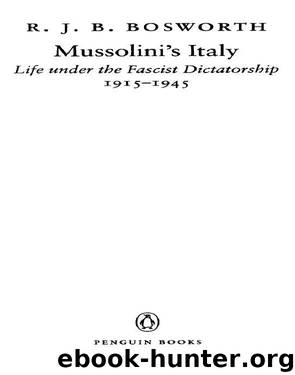Mussolini's Italy by R. J. B. Bosworth

Author:R. J. B. Bosworth
Language: eng
Format: epub
Publisher: Penguin Group US
12
Dictating full-time
If, by the early 1930s, men and women at the bottom of Italian society still cherished a complex set of identities, what had a decade of Fascist rule done to Benito Mussolini, the Duce, to his personality and character? To be sure his image in Italy was ubiquitous, his authority unchallenged, his rule seemingly complete. In the summer of 1932 a typical party report admitted, with what might be read as a disconsolate air, that, throughout the south, the people were ‘strangely fixing themselves with ever greater tenacity on the Duce and displaying a steadily weakening attachment to Fascism, which is comprehended through local feuds and the seldom or never exemplary behaviour of party bosses’.1 In that part of Italy, it had to be said, ‘Mussolinism’ now outweighed any lingering attraction offered by the party and its ideology.
But what was this object of so much love and approval actually like? Was Mussolini still the same person who had orchestrated the political seizure of power in 1922 and the conversion of his government into a regime and his own Prime Ministership into a dictatorship after 1925? Was the Duce really the man of granite that propaganda endlessly claimed him to be? What, too, about his power? It might be untrammelled in theory but how did it work in practice? How were decisions made in the Fascist state and how were the ideas of the leader converted into action? Was he, in sum, a strong dictator or a weak one?
At first glance, this last question might seem absurd, a non-issue. What is the point of being a dictator, it might be remarked, unless you dictate? Yet a literature has flourished for decades wondering about the possible weakness of Adolf Hitler and probing the limits of his rule (or attention span), while at least one historian has stated that Stalin, too, was in some sense a vulnerable chief. By this analysis, the Soviet ‘man of steel’ could not rely on his writ running without challenge across the diverse population of all the Russias. In response, it has been suggested, Stalin felt an immense frustration at the circumscribed reality of his power.2 Given the Italians were also plainly not yet forged into diamond-hard Fascist beings, how was the Duce reacting to what some might see as his anticlimactic ‘revolution’ ?3
Though blotted out by the trumpeting of his glory, a precariousness can indeed be detected in Mussolini’s biography. In 1925, for example, the decision to opt for full-scale dictatorship had apparently taken a psychological toll on the Duce, as perhaps had the whole Matteotti affair. Whether or not he was directly guilty of ordering the socialist’s death may still be debated, but Mussolini, unlike Stalin or Hitler, did not plume himself on murder, despite his addiction to the praise of violence. One of the oddities of the story of the Matteotti crime is how the Duce, after the event, paid what very much looks like blackmail money to Dumini and the other killers. Furthermore,
Download
This site does not store any files on its server. We only index and link to content provided by other sites. Please contact the content providers to delete copyright contents if any and email us, we'll remove relevant links or contents immediately.
| U.K. Prime Ministers | U.S. Presidents |
Waking Up in Heaven: A True Story of Brokenness, Heaven, and Life Again by McVea Crystal & Tresniowski Alex(37011)
Empire of the Sikhs by Patwant Singh(22176)
We're Going to Need More Wine by Gabrielle Union(18080)
Hans Sturm: A Soldier's Odyssey on the Eastern Front by Gordon Williamson(16705)
Leonardo da Vinci by Walter Isaacson(11912)
The Radium Girls by Kate Moore(10914)
Educated by Tara Westover(7069)
Tools of Titans by Timothy Ferriss(6955)
How to Be a Bawse: A Guide to Conquering Life by Lilly Singh(6697)
The Last Black Unicorn by Tiffany Haddish(5078)
Permanent Record by Edward Snowden(5004)
The Rise and Fall of Senator Joe McCarthy by James Cross Giblin(4849)
Promise Me, Dad by Joe Biden(4452)
The Wind in My Hair by Masih Alinejad(4427)
The Crown by Robert Lacey(4108)
A Higher Loyalty: Truth, Lies, and Leadership by James Comey(4037)
The Iron Duke by The Iron Duke(3642)
Joan of Arc by Mary Gordon(3262)
How to be Champion: My Autobiography by Sarah Millican(3190)
